Title : Stress, change, and peer to peer advice: A qualitative exploration of nursing faculty experiences
Abstract:
The achievement of faculty is crucial for both higher education enrollment and the fulfillment of national workforce needs in nursing. Educational institutions are facing mounting pressure to attract students to their nursing programs and produce competent nurses who are prepared for the job market. Educator stress, burn-out and fatigue greatly affect faculty success and retention. The purpose of this research was to increase understanding of the lived experiences of educators and identify tangible strategies to help them thrive in higher education. nursing A shortage of nursing faculty in colleges and universities presents a significant challenge in meeting this goal. This shortage limits enrollment in nursing programs and is perpetuated by various challenges such as increasing workloads, pay disparities, and staffing shortfalls within academia. These challenges create a stark contrast to the goals of nursing faculty for academic excellence and quality student outcomes. This study sought to examine the experiences of nursing faculty, with the aim of providing insights that could help educational institutions recruit and retain highly skilled educators, support the success of nurse educators in their roles, and ultimately meet the demand for an increased number of nursing graduates. The study gathered detailed accounts of nursing faculty experiences, challenges they face, changes in teaching practices, and coping advice for the demands of their challenging jobs. Throughout the study, the research team utilized specific research questions to guide their inquiry and analysis.
The research questions utilized in this research were:
- RQ1: How are Nursing faculty experiencing stress?
- RQ2: How have Nursing faculty changed their pedagogical practices including teaching, supervision, advising, and mentoring students?
- RQ3: What advice do current Nursing faculty have for new faculty regarding self-compassion, stress, and self-care?
Using an online open-ended cross-sectional survey and content analysis, this study explored qualitative data regarding nursing faculty experiences of stress, changes in their profession, and peer-to-peer faculty advice. Findings from 113 participants highlight recommendations from and for educators including pedagogical approaches as well as insights on compassion, compassion-fatigue, and self-compassion. Educator experiences are shared with the hope that faculty will use peer guidance to reflect on their own activities, make enhancements, and enact change. This qualitative research examines the experiences of nursing faculty who are currently dealing with increased stress levels and navigating multiple workplace changes. By inviting nurse educators to share their own insights and wisdom, the study aims to view them as experts on their own experiences. The recommendations offered by nurse educators are perceptive and heartfelt. The study also highlights the importance of addressing nurse educator needs for compassion and concerns regarding compassion fatigue, while emphasizing the need for enhanced self-compassion in this challenging profession.
Understanding the experiences of Nursing Faculty will:
- Help educational institutions identify the needs of nursing faculty, and in doing so, recruit and retain more highly needed nursing faculty in colleges & universities.
- Identify ways in which nursing faculty are currently experiencing heightened levels of stress in the workplace, reducing retention of highly qualified faculty.
- Highlight the insights aligned with faculty’s needs for compassion, concerns re: compassion-fatigue, & calls for enhanced self-compassion.
- Assist educators, administrators, campus stakeholders, and clinical placements to use this information to better support nursing faculty & enact change.



